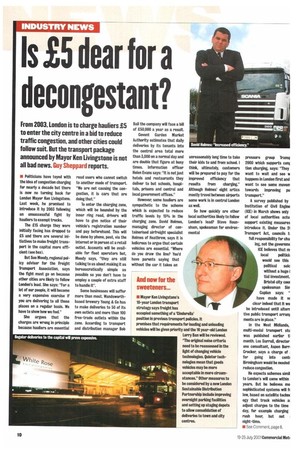Is 15 dear for a decongestant?
Page 10

If you've noticed an error in this article please click here to report it so we can fix it.
From 2003, London is to charge hauliers 15 to enter the city centre in a bid to reduce traffic congestion, and other cities could follow suit. But the transport package announced by Mayor Ken Livingstone is not all had news. Guy Sheppard reports.
• Politicians have toyed with the idea of congestion charging for nearly a decade but there Is now no turning back for London Mayor Ken Livingstone. Last week, he promised to introduce it by 2003 following an unsuccessful fight by hauliers to exempt trucks.
The 215 charge they were initially facing has dropped to 25 and there are several initiatives to make freight transport in the capital more efficient (see box).
But Sue Moody, regional policy advisor for the Freight Transport Association, says the fight must go on because other cities are likely to follow London's lead. She says: For a lot of our people, it will become a very expensive exercise if you are delivering to all these places on a regular basis. We have to show how we feel."
She argues that the charges are wrong in principle because hauliers are essential road users who cannot switch to another mode of transport. "We are not causing the congestion, it is cars that are doing that."
To enter the charging zone, which will be bounded by the inner ring road. drivers will have to give notice of their vehicle's registration number and pay beforehand. This will be done by phone, post, via the internet or in person at a retail outlet. Accounts will be available for fleet operators but, Moody says, "they are still talking to us about making it as bureaucratically simple as passible so you don't have to employ a couple of extra staff to handle it".
Some businesses will suffer more than most. Wandsworthbased brewery Young & Co has to make deliveries to 50 of its own outlets and more than 100 free-trade outlets within the zone. According to transport and distribution manager Bob Ball the company will face a bill of 250,000 a year as a result.
Covent Carden Market Authority estimates that daily deliveries by its tenants into the central area total more than 3,000 on a normal day and are double that figure at busy times. Information officer Helen Evans says: "It is not just hotels and restaurants they deliver to but schools, hospitals, prisons and central and local government offices.'
However, some hauliers are sympathetic to the scheme which is expected to reduce traffic levels by 15% in the charging zone. David Holmes, managing director of containerised airfreight specialist Holmes of Heathrow, says it is ludicrous to argue that certain vehicles are essential. "Where do you draw the line? You'd have parents saying that without the car it takes an unreasonably long time to take their kids to and from school. I think, ultimately, customers will be prepared to pay for the improved efficiency that results from charging." Although Holmes' eight attics mostly travel between airports some work is in central London as well.
So how quickly are other local authorities likely to follow London's lead? Steve Hounsham, spokesman for environmental pressure group Trans; 2000 which supports conj Oen charging, says: "They want to wait and see w happens in London first and want to see some mover towards improving pu transport."
A survey published by Institution of Civil Engine (ICE) in March shows only of local authorities actu support existing measures introduce it. Under the 21 Transport Act, councils t, full responsibility for cha ing, not the governmi ICE believes that m local politick would see this political suic without a huge i tial investment. Bristol city coin spokesman Sin Caplan says: " have made it vi clear indeed that it we be introduced until alterr tive public transport arranj ments are in place."
In the West Midlands, multi-medal transport stu was published earlier ti month. Les Oarrall, director one consultant, Aspen Burr Crocker, says a charge of for going into centi Birmingham would be needed reduce congestion.
He expects schemes simil to London's will come within years. But he believes mo sophisticated systems will fi low, based on satellite techni ogy that track vehicles a adjust charges to the time day, for example charging rush hour, but not night-time.
• See Comment, pages.














































































































